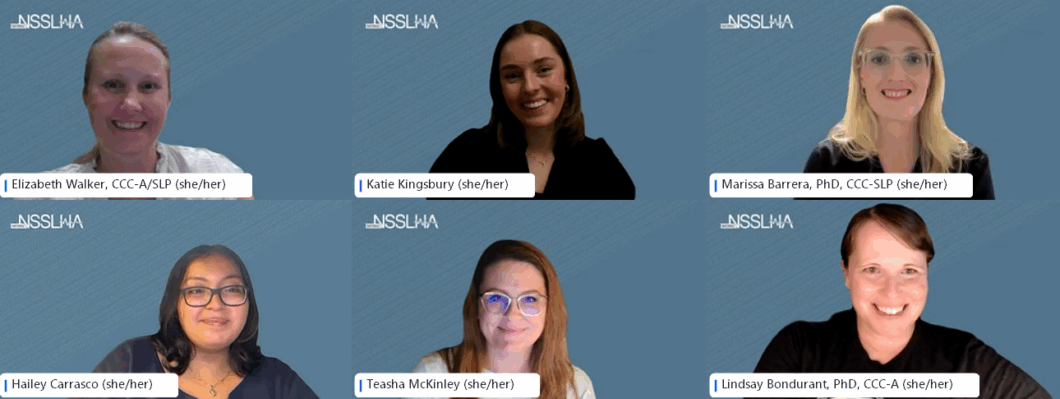Applying to graduate programs in speech-language pathology (SLP) and audiology can feel overwhelming, but with the right guidance, you can approach it strategically and confidently. We spoke with panelists in the field with admissions experience to give you tips on every step—from searching for schools to preparing for interviews. Watch the entire conversation below:
1. CSDCAS Overview
The CSDCAS (Communication Sciences and Disorders Centralized Application Service) is the centralized platform where most SLP and audiology programs collect applications. Through CSDCAS, you can submit transcripts, letters of recommendation, and personal statements to multiple programs, streamlining the process.
The CSDCAS Director of Centralized Admissions emphasized the importance of accuracy and completeness: check every section carefully, proofread your materials, and ensure all deadlines are met. This attention to detail not only reflects your professionalism but also helps prevent delays in application review.
For more tips directly from CSDCAS, you can visit their Help Center page.
2. School Search
Finding the right program is about more than location. Consider program focus, faculty expertise, clinical opportunities, and population served. To explore program options, use ASHA’s EdFind.
As you narrow your list, consider utilizing National NSSLHA’s Grad School Criteria Checklist [PDF] to help you compare programs based on your priorities.
Additionally, National NSSLHA provides a wealth of resources through the Grad School Application Resource Center and archives of past grad school blog posts on the NSSLHA Blog. These resources can help you make informed decisions and identify programs that align with your interests and goals.
3. Resumés
A strong resume highlights both your academic achievements and your unique personal qualities. Panelists recommend including experiences that demonstrate interpersonal skills, empathy, and dedication, such as volunteer work, hobbies, or meaningful projects.
When preparing your resume:
- Be honest and accurate: Don’t exaggerate; truth and quality are central to the profession’s ethics.
- Highlight what makes you unique: Experiences like helping at Special Olympics or engaging with specific populations can help you stand out.
- Use your letters of recommendation: Professors can reinforce your skills and character, so remind them of experiences they may not immediately recall.
4. Personal Statement
Your personal statement is your chance to show who you are and why you’re drawn to the field. Experts advise:
- Avoid clichés: Words like “passion” or phrases like, “I just want to help people” are overused. Instead, focus on concrete examples.
- Be genuine: Share experiences that truly reflect your journey, interests, and goals.
- Demonstrate awareness of the field: You don’t need a rigid career path yet, but showing curiosity and knowledge about your areas of interest is important.
- Patient populations: It’s okay to mention populations you’re interested in working with, but balance it with flexibility and an understanding of the field’s breadth.
Remember, a personal story is compelling, but it’s not necessary to have a direct personal connection to the field. Focus on what draws you to SLP or audiology and what you can contribute to the profession.
5. Interviews
Interviews are your opportunity to demonstrate professionalism, communication skills, and genuine interest. Tips include:
- Group interviews: Listen actively, don’t interrupt, and build on others’ points. Your people skills will shine.
- Individual interviews: Prepare answers to common questions (e.g., “Why do you want to be an SLP or audiologist?” “What are your strengths and weaknesses?”).
- Come with questions: Asking informed questions about the program, faculty, or student outcomes shows preparation and engagement. Consider asking about:
- Student outcomes and graduation rates
- Clinical opportunities
- Support for diverse learning styles and accommodations
Practice your answers, stay genuine, and remember that interviewers want to see the real you.
6. Other Requirements
Other application components can include transcripts, prerequisites, letters of recommendation, and essay prompts. Here are additional tips:
- Letters of recommendation: Build relationships with faculty early, remind them of key experiences, and be respectful of their time.
- Non-traditional applicants: Students from diverse backgrounds, previous careers, or military service bring valuable perspectives and life experience—embrace what makes you unique.
- Managing multiple applications: Graduate school applications can be complex, but tools like National NSSLHA’s Grad School Application Tracker [XLS] help you keep deadlines, materials, and progress organized. This tracker is ideal for monitoring your progress on all of your application materials in one place.
Applying to graduate programs in SLP and audiology requires preparation, reflection, and organization. Use these strategies and resources to navigate the process with confidence, showcase your unique strengths, and find the program that’s the right fit for you.

